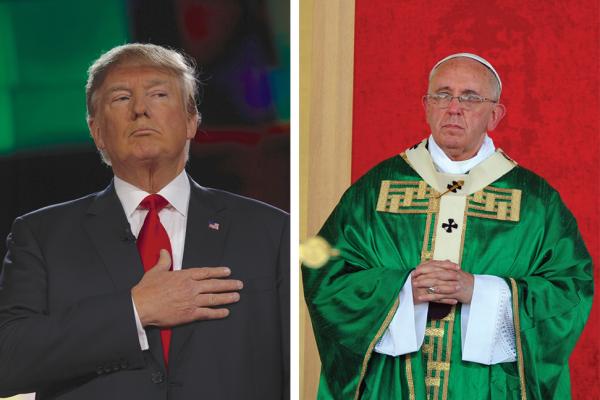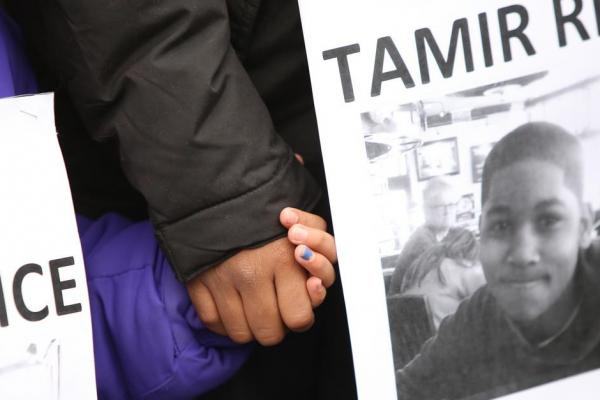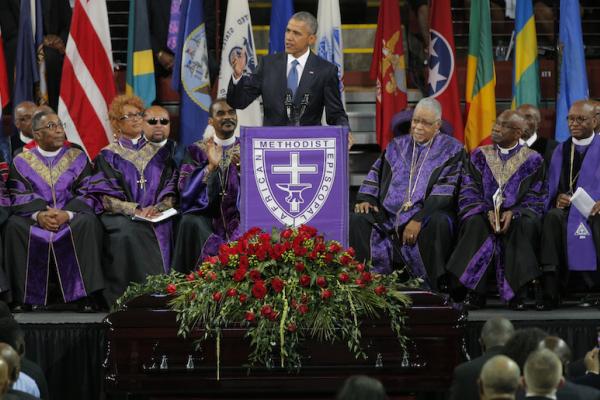“Oftentimes we’re in a hurry when we call others. But they felt the pope was truly interested in them,” Gabrieli told the Catholic news site Aleteia, which also reported that the boy is seven. “At that moment, they were at the center of his attention. This is what really struck them. He was asking about them; they felt he really wanted to know how they were doing.”
Even among young evangelicals, more contemporary religious thinkers — Karen Swallow Prior or Rachel Held Evans — might be viewed as more accessible. But Colson’s intense activism, which supporters contend advocated issues and not political parties, seems to appeal to some in a generation seeking a course correction from the likes of Jerry Falwell and Pat Robertson. That activism found its first expression in the ministry that became Prison Fellowship. Though Colson’s time in jail was relatively brief, he was moved by the experience and by those of the men he met behind bars.
Americans’ most admired man and woman in the world are — once again — President Barack Obama and former Secretary of State Hillary Clinton.
But the shocker in the Gallup Poll’s Most Admired List released Monday may be the No. 2 spot in the survey, where Donald Trump tied Pope Francis in the year the pontiff visited this country for the first time.
Since the Dec. 2 attacks in San Bernardino, Calif., the American-Arab Anti-Discrimination Committee has received more than a dozen phone calls from Muslim Americans locally reporting a variety of workplace discrimination and harassment complaints. Of those calls, one has triggered a lawsuit, and two similar workplace suits are in the works, said Fatina Abdrabboh, executive director of the Michigan office, who hopes the litigation sends a message to employers.
“We’re watching. This stuff can’t go unchecked … and if you think of putting someone in the back room or letting them go because of the headscarf, you can’t do it,” said Abdrabboh, who urges the public and employers not to “feed into this rhetoric against us.”
Officer Timothy Loehmann will not face charges in the shooting death of 12-year-old Tamir Rice after a grand jury failed to indict Monday. The Cuyahoga County prosecutor’s office announced Monday that Loehmann's partner, Frank Garmback, will also face no charges. The news comes more than a year after Rice was killed while carrying a toy gun at a park in Cleveland.
Religion inspired countless other acts of forgiveness, mercy, and hope this year. But religion — or perversions of it, some would say — also inspired horrific violence: the “faith-based” cleansing of ancient lands, and bombings and shootings motivated by scriptural justifications. It was a year also of religious-inspired activism, seen perhaps most prominently in a pope who advocated for the poor and for a solution to climate change. Here is an overview of some of the most consequential religion stories of the past year, with thoughts on what to look forward to 2016.
Over the course of this year, there have been many moments have brought me hope. From the show of solidarity in the faith community after the terrible tragedy in Charleston, S.C., to seeing many speak out against anti-Muslim rhetoric. I’ve witnessed Pope Francis bring his message of unity and peace to America. I’ve seen young and old declare that black lives do indeed matter. And we celebrated a landmark climate agreement from the world’s leaders in Paris. I am hopeful for the future ... but only if we put out faith into action for social justice, and we need your help.
Aside from midnight church services, family reunions, and Ryan Seacrest parties, a significant number of people will celebrate New Year’s Day from the less festive setting of one of the many Syrian refugee camps, in countries like Greece, Turkey, Lebanon, Jordan, or Iraq. These camps symbolize the narrative of the millions of Syrians who have fled their homeland due to the civil war raging since 2011. Their past is filled with political and financial trauma associated with refugee life. Their future is even more threatening as they struggle to reunite with loved ones, deal with the tragic deaths, and readjust to a new life where their Syrian passports may be their single economic asset. Their future is largely unknown. For these survivors, what is so “happy” about 2016?
1. 12 Things to Do on the 12 Days of Christmas
Don’t take down that tree just yet. Remember that Christmas is an entire season. Today we celebrate the Feast of St. Stephen — the first Christian martyr. Let these ideas take you all the way through Epiphany.
2. ICYMI: Why Jesus Was, and Is, a Political Threat
“The language of Mary is the narrative of revolution and redistribution, two words that the powers that be just hate. And while the revolution that Christ brings is not violent, it is nonetheless completely transformational. Mary got it.”
3. Las Posadas: Searching for an Inn
Washington Post features the Hispanic Christian tradition of recreating Joseph and Mary’s search for shelter. “Making it real, and making it something that’s close to home, fits in closely with Hispanic/Latino theology.”
This is not the talk of charity and giving Christmas toys and turkeys to the less fortunate. The language of Mary is the narrative of revolution and redistribution, two words that the powers that be just hate. And while the revolution that Christ brings is not violent, it is nonetheless completely transformational. Mary got it.
Herod did too. The nearest political ruler to the birth of Christ immediately saw the possible implications for him.








